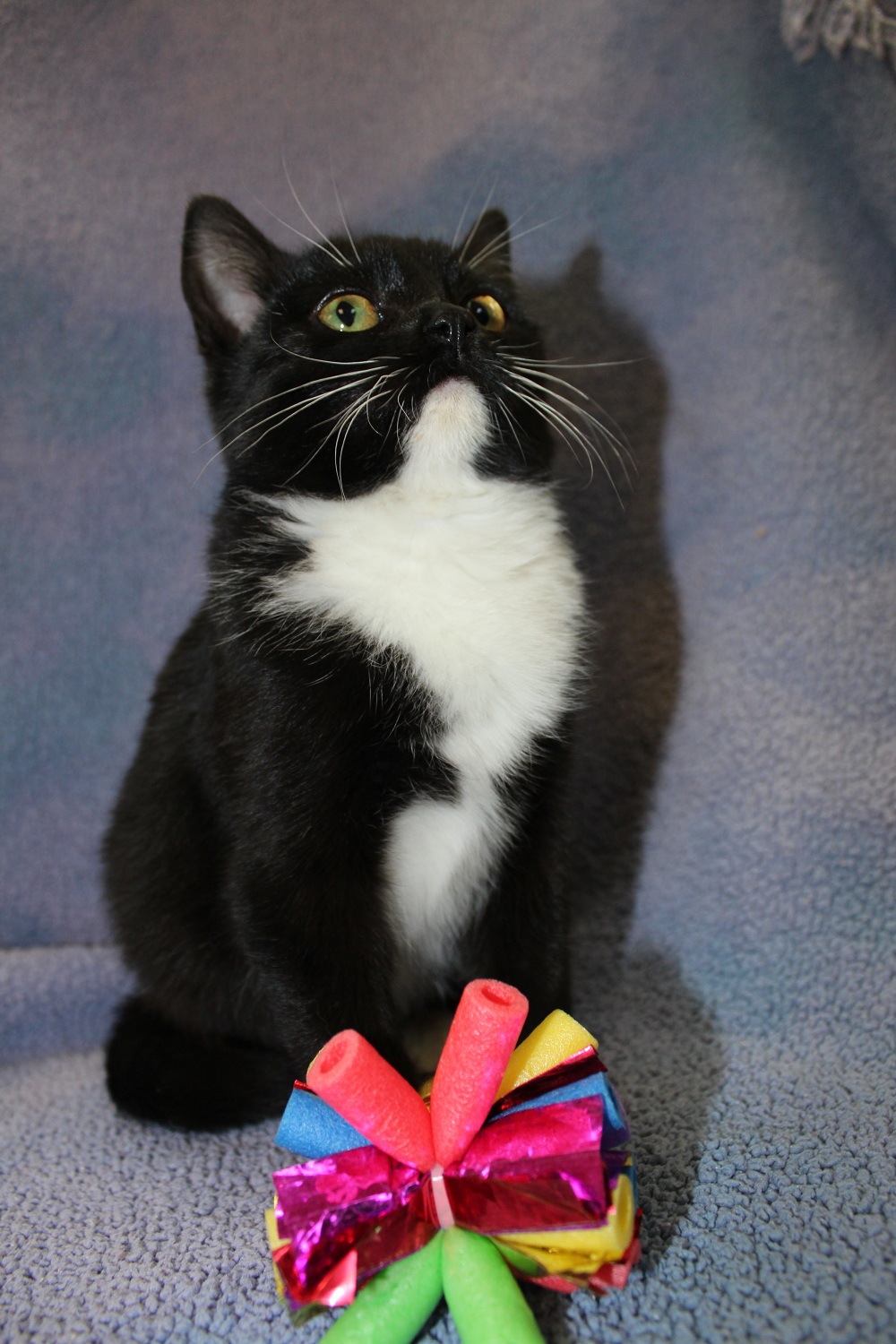
The holidays are a busy and fun time with decorating, baking, and visiting. The below tips will not only help your pet enjoy the holidays, but will hopefully prevent less stress for you so you can enjoy this month with your friends and family, both two and four legged.
Christmas Trees/ Decorations
- Pine needles along with wire hooks and small breakable ornaments can cause injury as they pass through the intestinal tract.Ensure your tree is well anchored as cats often find them an enticing object to climb, or as in the case of dogs, tug at or knock it over with their strong tails.
- Tinsel, ribbons and other strings can be extremely problematic as they are an exciting toy especially for cats, but can lead to intestinal blockages as they tangle the small intestines or ball up in the stomach.
- Preservatives in the water for your tree can lead to stomach upset
- Electric cords are often fun to pull and chew on for many of our curious pets. Remember, electrocution, shocks or even severe burns are a major risk.
- Avoid purchasing pet toys with small or soft pieces that can be chewed and swallowed. Nylon bones tend to splinter less than plastic ones. Be sure to inspect pet toys regularly and discard deteriorating ones.
Delicious Treats and Sweets
- Chocolate contains caffeine and theobromine and toxicity increases with the darkness of the chocolate. Keep all chocolate treats safely stored away. Though not harmful to us, these toxins can be deadly to cats and dogs.
- Macadamia nuts contain an unknown dog specific toxin that leads to weakness, hindend paresis and ataxia.
Raisins in an individual unknown quantity can cause kidney disease and failure. - Table scraps can not only lead to obesity issues and potential food allergy concerns or even pancreatitis, but bones, especially poultry, are dangerous. They can lodge in the throat or within the intestinal tract leading to a foreign body obstruction requiring surgery to remove.
- Alcohol intoxication can be a serious issue in dogs as the substance can be very attractive to our canine friends. Signs of intoxication include: a wobbly gait, depression, disorientation and vomiting.
- Xylitol is a dangerous artificial sweetener. This sugar substitute found in chewing gum, some candies and baked goods can lead to liver failure.
Poisonous Plants
- The poinsettia plant is not necessarily toxic, but ingestion of its sappy leaves can lead to digestive upset causing excess salivation, vomiting and diarrhea.
Amaryllis bulbs can also lead to intestinal upset, such as vomiting and hypersalivation. However with dehydration as a possible outcome, especially in cats, caution should be ensued when having these around. - Holly has the same toxic compounds as chocolate and can cause digestive upset along with nervous system depression.
Mistletoe is a very serious toxic threat to our animal friends. Severe digestive tract irritation, as well as a decrease in heart rate and temperature, breathing difficulties, unsteadiness and increase in thirst can be seen. Seizures, coma and even death can be possible if large enough amounts are ingested.
Festive Gatherings
- Visitors are always a warm welcome over the holidays, in most instances. However, with all the hustle and bustle sneaky pets can escape outdoors so ensure proper identification is present on every animal household member. Advise guests to watch for any escapes and to refrain from offering any treats. It is always good to have healthy appropriate treats available. If your pets are hesitant around children, discuss this with visitors so stressful encounters can be minimized as anxiety levels can be high in these instances. Provide a safe and quiet place with fresh water for your pet to retreat to during times of high stress.
- Pets as gifts can provide a warm addition however with all the excitement and stress the holidays bring, the care and attention a new housemate requires can be forgotten. Instead why not think of giving a gift certificate to your local SPCA or humane society so the new addition can be introduced to the home as things settle down in the New Year.
Additional Winter Hazards:
- Warm engines can be a safe refuge for cats and wildlife on cold winter days. Be cautious when starting your vehicles.
- Cold weather and outside dogs/cats – always provide ample warm shelter with thick bedding in a location out of the wind and monitor them closely and regularly. Bring in your pets indoors on days/nights below freezing. Ensure fresh water is always available and remember if it is cold enough it can freeze.
Be cautious of thin ice as pets may venture on unsafe surfaces and fall through becoming victim to hypothermia or drowning. - Frostbite and hypothermia are two serious concerns with pets left outside in the cold for too long. Frostbite results when the blood is pulled from the extremities to the core of the body. An animal’s ears, paws or tail are at risk if ice crystals start to form in the tissue leading to long-term damage. If you are concerned call your veterinarian and start slowly warming your pet.
- Remember older pets or ones with underlying health problems are more prone to developing issues more quickly.
- Pet safe antifreeze is available for purchase and we recommend using these products and telling others to also use them. However, you should not automatically assume that everyone is using a pet safe product for their own vehicles. Please be aware of puddles or slight dripping around cars and on roads/driveways/parking lots etc. Your pet may drink from these ‘sweet tasting’ puddles or lick their paws after walking through them. To be safe always wipe your pet’s feet after a walk with a warm wash cloth. Ingesting antifreeze can cause acute renal failure and may present as lethargy, loss of appetite, and/or vomiting. Contact your Veterinarian immediately if you suspect poisoning from antifreeze.
- In BC we do not use rock salt, but use de-icing products. Some are pet friendly and if you can use these products this will help alleviate ingestion by eating or licking of paws. After walks use a warm wash cloth to wipe your pet’s feet to get off any de-icing residue. Using gravel or sand may be an option for you, instead of using de-icing chemicals, however remember there is manual clean up afterwards to avoid runoff into drains and waterways.
Information gathered from the following sources: the Canadian Veterinary Medical Association, the American Animal Hospital Association and Healthy Pet, the BC SPCA and the Animal Poison Control Centre.
